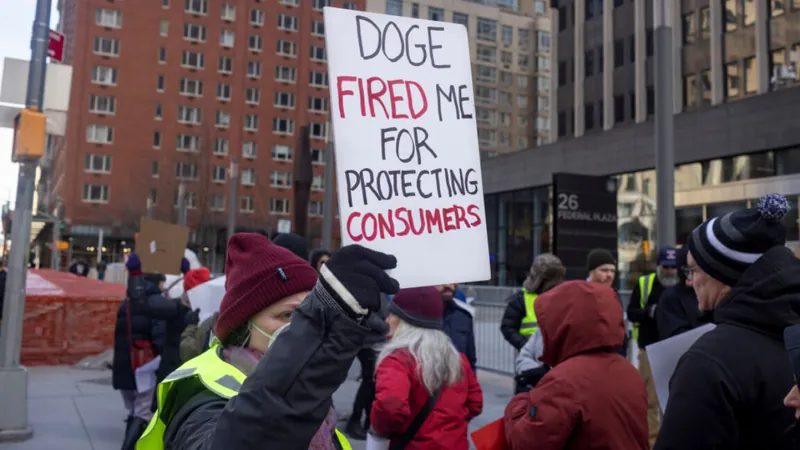
Is DOGE on the Brink of Failure? Experts Are Sounding the Alarm!
2025-06-25
Author: Ling
Experts Question the Viability of DOGE
Critics are increasingly labeling Elon Musk's Department of Government Efficiency (DOGE) as a failed experiment, as lawmakers fiercely debate how much funding to allocate to this controversial agency for the upcoming year.
During a recent subcommittee hearing, Republicans and Democrats clashed over DOGE's future. While Republicans aimed to solidify the 'DOGE process' to cut waste and fraud, Democrats countered that DOGE has actually moved in the opposite direction, hurting American citizens in the process.
Disastrous Outcomes for Government Services
Rep. Suhas Subramanyam (D-Va.) claimed that DOGE has contributed to poor services, a significant loss of talent within the federal government, and ultimately, higher long-term costs for taxpayers.
Originally designed to save the U.S. government a staggering trillion dollars under Musk's leadership, DOGE has purportedly saved only about $180 billion. This number has come under scrutiny after reports surfaced that nearly 40% of the claimed savings were fabricated, according to Elaine Kamarck from the Brookings Institute.
A Flawed Approach to Efficiency
Kamarck emphasizes that the 'DOGE process' often leads to hasty mass layoffs, creating a brain drain that detrimentally impacts the very agencies it seeks to streamline. Instead of enhancing efficiency, the process has inadvertently caused dysfunction.
Furthermore, critics argue that Musk is using DOGE to test controversial theories about executive power, making sweeping changes without seeking congressional approval and endangering critical agency operations.
Ripple Effects on Critical Services
The consequences of DOGE's actions are being felt across essential services. Emily DiVito from the think tank Groundwork Collaborative pointed to significant customer service failures at the Social Security Administration as a key example of DOGE's negative effects.
Experts warn that the fallout from DOGE’s mismanagement could linger throughout Trump's entire term. With the government scrambling to rehire laid-off workers, the loss of skilled personnel could create long-term deficiencies critical to effective governance.
Financial Fallout for Americans
The nonprofit Citizens for Ethics warns that DOGE’s cuts could lead to over $10 billion in economic losses across various agencies. For instance, the reduction in the Consumer Financial Protection Bureau—an agency that clawed back over $26 billion in funds from irresponsible businesses—has further exacerbated taxpayer burdens.
Moreover, the Internal Revenue Service's staffing cuts could cost the U.S. an estimated $500 billion in unpaid taxes, significantly undermining government revenue.
The Uncertain Path Ahead for DOGE
As Musk's influence wanes, the agency faces an uncertain future. Despite efforts from some lawmakers to stabilize DOGE and ensure its funding, skepticism continues to grow regarding its long-term viability.
Rep. Jasmine Crockett (D-Texas) attempted to subpoena Musk to explain DOGE's agenda, but Republican opposition thwarted her efforts. Skepticism is mounting as many experts believe DOGE is on a path to eventual failure, with one former staffer predicting that it will soon fizzle out due to a lack of substantial evidence for its effectiveness.
Can DOGE Survive Without Musk?
DOGE's future could be imperiled as it transitions into an agency with potentially less centralized oversight. Critics suggest that without Musk’s unique approach, the agency might struggle to maintain momentum.
New leadership and political appointees may shift priorities, and there's an argument that the essential IT expertise previously brought in under Musk is sorely lacking within the agency. With a court-ordered review of DOGE's access to government systems underway, the public will soon learn more about its actual performance and any lapses in accountability.
A Call to Action for the Future
As we observe the unfolding landscape of DOGE, Kamarck warns of potential 'time bombs' throughout government agencies as efficiency initiatives collide with necessary operations. 'The question remains: which malfunction will become evident first?' she concludes, hinting that critical services like FEMA's disaster preparedness could be among the first to suffer.
As concerns grow over DOGE's long-term impacts, Americans relying on government programs should brace for potential disruptions, all while the fate of this ambitious agency hangs in the balance.



 Brasil (PT)
Brasil (PT)
 Canada (EN)
Canada (EN)
 Chile (ES)
Chile (ES)
 Česko (CS)
Česko (CS)
 대한민국 (KO)
대한민국 (KO)
 España (ES)
España (ES)
 France (FR)
France (FR)
 Hong Kong (EN)
Hong Kong (EN)
 Italia (IT)
Italia (IT)
 日本 (JA)
日本 (JA)
 Magyarország (HU)
Magyarország (HU)
 Norge (NO)
Norge (NO)
 Polska (PL)
Polska (PL)
 Schweiz (DE)
Schweiz (DE)
 Singapore (EN)
Singapore (EN)
 Sverige (SV)
Sverige (SV)
 Suomi (FI)
Suomi (FI)
 Türkiye (TR)
Türkiye (TR)
 الإمارات العربية المتحدة (AR)
الإمارات العربية المتحدة (AR)